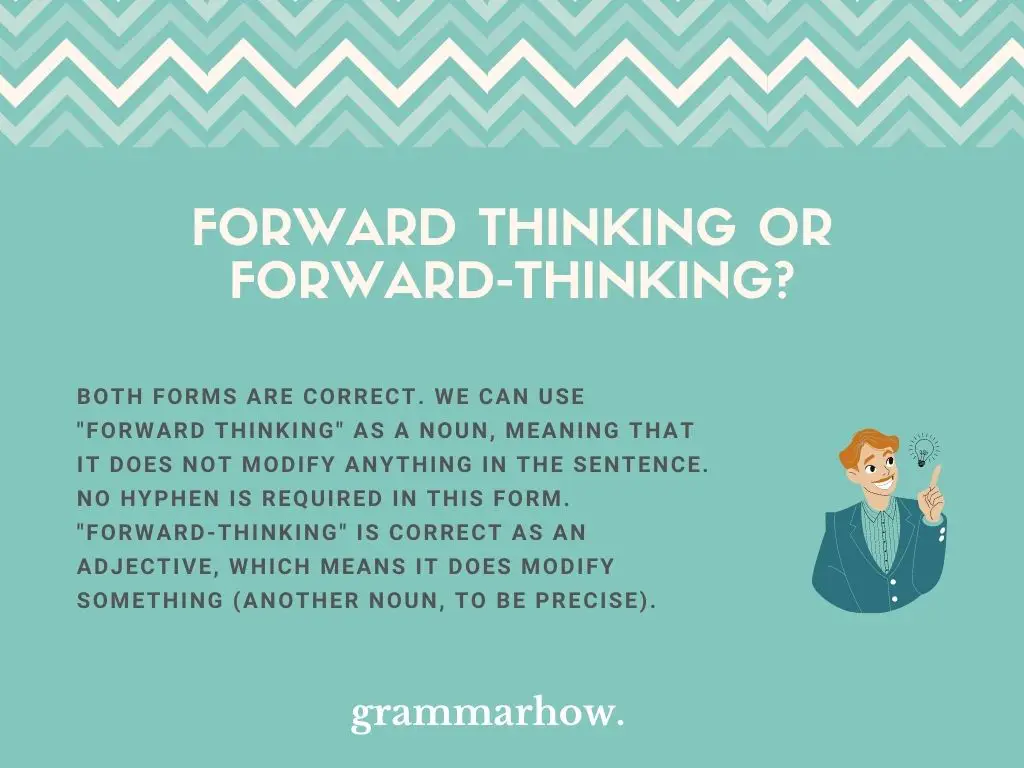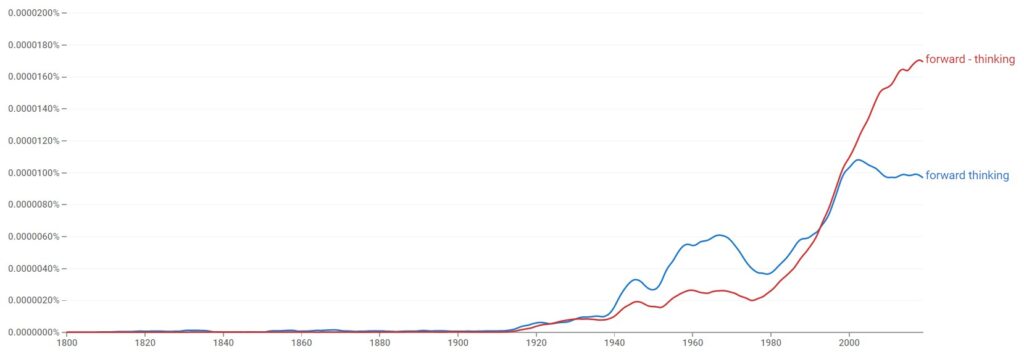You can use both “forward thinking” and “forward-thinking” in your writing. However, you need to know when it’s correct as one or two words and when the hyphenated form will suffice. Luckily, this article is here to help you!
Forward thinking vs. Forward-thinking
Both forms are correct. We can use “forward thinking” as a noun, meaning that it does not modify anything in the sentence. No hyphen is required in this form. “Forward-thinking” is correct as an adjective, which means it does modify something (another noun, to be precise).

According to Google Ngram Viewer, “forward-thinking” is the most popular choice of the two. However, you can see that “forward thinking” still sees a decent amount of usage, which proves that both forms are correct, and it depends on the method with which you are writing them.

Both The Oxford Dictionary and The Cambridge Dictionary define “forward-thinking” as an adjective form. They use the hyphen and provide examples showing how the hyphenated form modifies different nouns when used in sentences.
Both dictionaries also state that “forward thinking” is an acceptable form when written as a phrasal noun. There is no need to hyphenate them in this form, and more examples are provided by both to demonstrate how the noun form works.
If you’re struggling to understand the differences between adjectives and nouns, you can refer to the following:
- Adjective: Your forward-thinking attitude is what got you this position in the first place.
- Noun: I love her forward thinking! She’s going places; I can just tell!
Forward thinking
You can write “forward thinking” as two words when it is not an adjective. In this form, we use it as a phrasal noun to show that someone is thinking ahead or covering a lot of ideas. There are no other nouns present in the sentence when written like this.
Noun forms do not modify other noun forms. That’s why it’s not possible to see a hyphenated variation of “forward-thinking” when we use it as a noun.
You can read through these examples to see how the noun form works:
- I like to see a bit more forward thinking from my team, but clearly nobody is willing to provide it.
- We will not limit the forward thinking put forward by the people that work for us. It doesn’t help business.
- If you’re prepared to work with forward thinking in mind, we’re prepared to hire you for your ideas.
- I like his forward thinking. It’s really impressive, and I think he’s going to go far!
Forward-thinking
You should hyphenate “forward-thinking” when it is written as an adjective. We are using it to modify a noun in the sentence in this form. Typically, that noun will come after “forward-thinking” to show how the two words link together to change the meaning.
If you’re not sure about hyphen rules, you can refer to the AP Stylebook to help you. According to AP Style, hyphens work to connect multiple words when they modify the same noun.
Since “forward” and “thinking” both work to modify the same noun, we can use a hyphen to connect them. “Forward-thinking” becomes a compound adjective in this form, which helps us to explain our meaning to the reader more clearly.
You should check these examples out to help you understand it:
- I’m looking for some more forward-thinking employees that are ready to work as part of this team.
- Your forward-thinking attitude is what got you here, and now I expect you to demonstrate it once more.
- I haven’t got time for forward-thinking people! They make me feel small, and I don’t want them around my business.
- The forward-thinking plans have been put in place! Now it’s time to see them work!
Is “Thinking” Capitalized In The Word “Forward-Thinking”?
Finally, it might help to learn more about how hyphens work with capitalization rules.
Typically, “forward-thinking” needs no capital letters. It is not a proper noun, meaning that neither part of the hyphenated word needs capitalizing. However, that doesn’t it’s incorrect.
You might find it useful to capitalize both parts of the hyphen in certain title formats. If your title style means you capitalize every other word, then “Forward-Thinking” should have both parts capitalized to be uniform with the rest of it.

Martin holds a Master’s degree in Finance and International Business. He has six years of experience in professional communication with clients, executives, and colleagues. Furthermore, he has teaching experience from Aarhus University. Martin has been featured as an expert in communication and teaching on Forbes and Shopify. Read more about Martin here.
